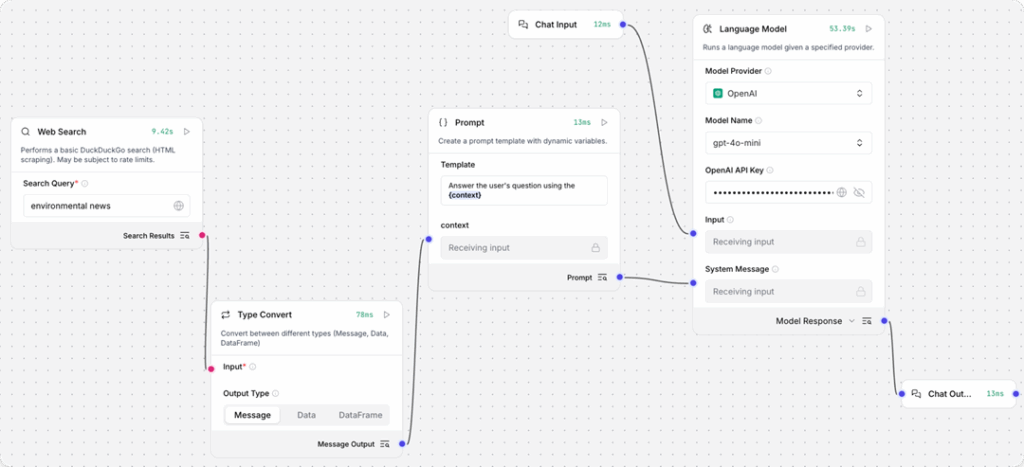Type Convert
The Type Convert component converts data from one type to another. It supports Data, DataFrame, and Message data types.
Data
A Data object is a structured object that contains a primary text key and other key-value pairs:
“data”: {
“text”: “User Profile”,
“name”: “Charlie Lastname”,
“age”: 28,
“email”: “charlie.lastname@example.com”
},
The larger context associated with a component’s data dictionary also identifies which key is the primary text_key, and it can provide an optional default value if the primary key isn’t specified. For example:
{
“text_key”: “text”,
“data”: {
“text”: “User Profile”,
“name”: “Charlie Lastname”,
“age”: 28,
“email”: “charlie.lastname@example.com”
},
“default_value”: “”
}
DataFrame
A DataFrame is an array that represents a tabular data structure with rows and columns.
It consists of a list (array) of dictionary objects, where each dictionary represents a row. Each key in the dictionaries corresponds to a column name. For example, the following DataFrame contains two rows with columns for name, age, and email:
[
{
“name”: “Charlie Lastname”,
“age”: 28,
“email”: “charlie.lastname@example.com”
},
{
“name”: “Bobby Othername”,
“age”: 25,
“email”: “bobby.othername@example.com”
}
]
Message
A Message is primarily for passing a text string, such as”Name: Charlie Lastname, Age: 28, Email: charlie.lastname@example.com”. However, the entire Message object can include metadata about the message, particularly when used as chat input or output.
For more information, see Robility flow data types.
Use the Type Convert component in a flow
The Type Convert component is typically used to transform data into a format required by a downstream component. For example, if a component outputs a Message, but the following component requires Data, then you can use the Type Convert component to reformat the Message as Data before passing it to the downstream component.
The following example uses the Type Convert component to convert the DataFrame output from a Web Search component into Message data that is passed as text input for an LLM:
1. Create a flow based on the Basic prompting template.
2. Add a Web Search component to the flow, and then enter a search query, such as environmental news.
3. In the Prompt Template component, replace the contents of the Template field with the following text:
Answer the user’s question using the {context}
The curly braces define a prompt variable that becomes an input field on the Prompt Template component. In this example, you will use the context field to pass the search results into the template, as explained in the next steps.
4. Add a Type Convert component to the flow and then set the Output Type to Message.
Because the Web Search component’s DataFrame output is incompatible with the context variable’s Message input, you must use the Type Convert component to change the DataFrame to a Message in order to pass the search results to the Prompt Template component.
5. Connect the additional components to the rest of the flow:
a. Connect the Web Search component’s output to the Type Convert component’s input.
b. Connect the Type Convert component’s output to the Prompt Template component’s context input.
6. In the Language Model component, add your OpenAI API key.
If you want to use a different provider or model, edit the Model Provider, Model Name, and API Key fields accordingly.
7. Click Playground, and then ask something relevant to your search query, such as latest news or what’s the latest research on the environment?.
Result :
The LLM uses the search results context, your chat message, and it’s built-in training data to respond to your question. For example:
Here are some of the latest news articles related to the environment:
Ozone Pollution and Global Warming: A recent study highlights that ozone pollution is a significant global environmental concern, threatening human health and crop production while exacerbating global warming. Read more
…
For more information, see Robility flow data types.
Type Convert parameters
| Name | Display Name | Info |
|---|---|---|
| input_data | Input Data | Input parameter. The data to convert. Accepts Data, DataFrame, or Message input. |
| output_type | Output Type | Input parameter. The desired output type, as one of Data, DataFrame or Message. |
| output | Output | Output parameter. The converted data in the specified format. The output port changes depending on the selected Output Type. |


